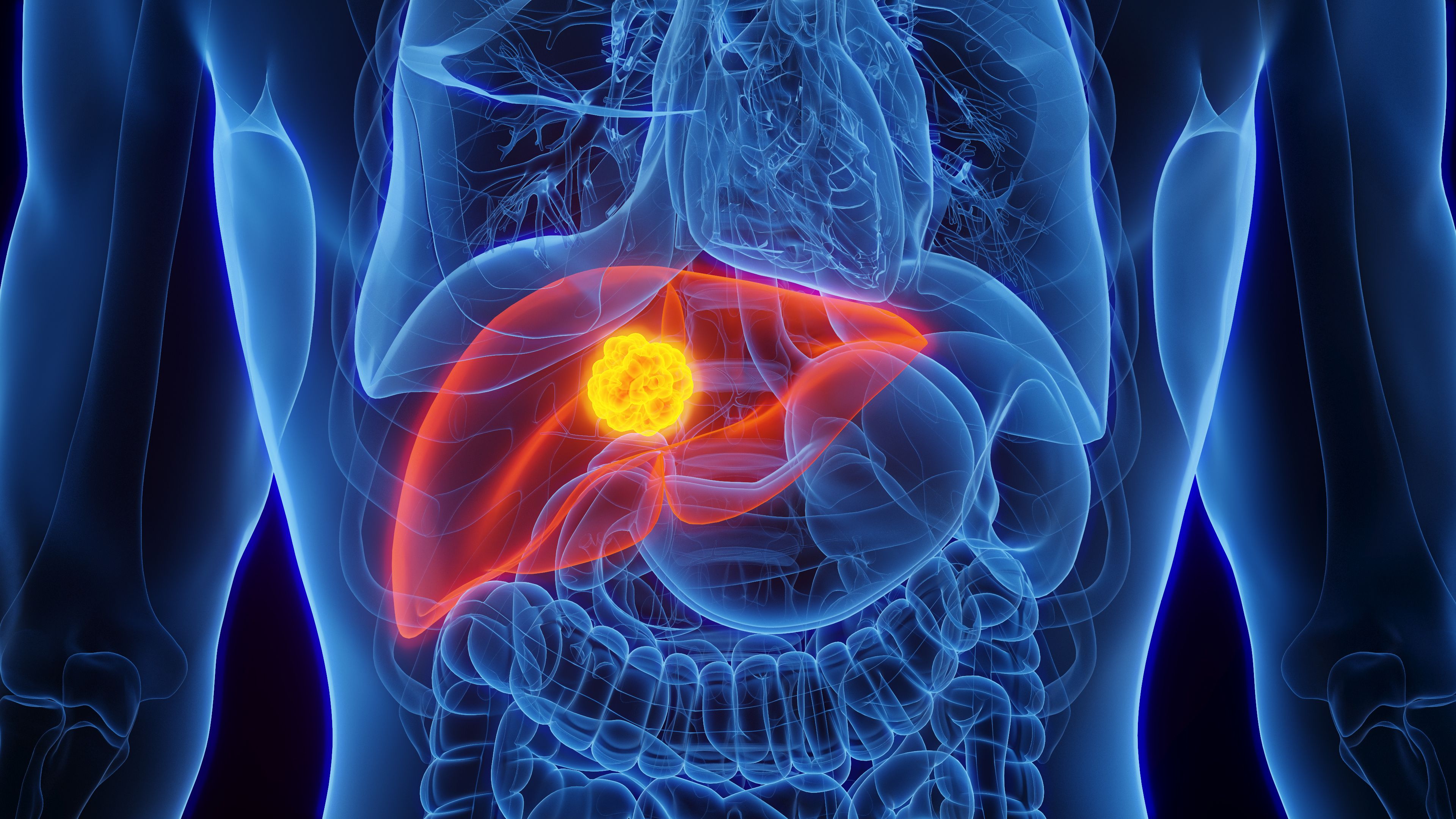Dovitinib Companion Diagnostic Shows Results in RCC
The tool shows promise to predict a patient’s response to dovitinib to better inform treatment options for patients with renal cell carcinoma and other solid tumors.
3D rendering of human liver: ©SciePro - stock.adobe.com

The drug response predictor companion diagnostic for dovinitib (DRP-Dovitinib) demonstrates potential to identify patients with advanced renal cell carcinoma (RCC) who are most likely to respond positively from treatment with dovitinib, according to a study in PLOS.1
In the sensitive group, median progression-free survival (PFS) was 3.8 months, and in the sorafenib arm, median PFS was 3.6 months (hazard ratio [HR], 0.71; 95% CI, 0.51-1.01). The median overall survival (OS) in the sensitive group was 15.0 months. In the sorafenib arm, median OS was 11.2 months (HR, 0.69; 95% CI, 0.48-0.99).
Observed clinical benefit increased with a higher drug response predictor (DRP) score. The DRP-Dovitinib was also unable to identify patients that benefited from sorafenib, which supports that the DRP-Dovitinib is drug-specific and not prognostic.
Allarity Therapeutics, the manufacturer of DRP-Dovitinib, also reported that the device delivers a 2-4-fold higher response rate when combined with dovitinib compared with use without a prior DRP screen.2
“Our results suggest that the proposed DRP-Dovitinib biomarker algorithm may identify a subpopulation of RCC patients with increased clinical benefit with dovitinib treatment,” study authors wrote. “The primary end point of PFS was not met, but the secondary end point OS was statistically significant improved.”
DRP-Dovitinib was applied retrospectively to a phase 3 trial (NCT01223027) that compared dovitinib with sorafenib (Nexavar) in patients with RCC. Archival tumor samples were obtained from consenting patients from this trial. The DRP-Dovitinib returns a likelihood score from 0%-100% and classified patients as either sensitive (n = 49; DRP score >50%) or resistant (n = 86; DRP score ≤ 50%). Investigators then compared the sensitive population with the unselected sorafenib arm (n = 286).
The DRP-Dovitinib was also tested in phase 2 trials for 4 different non-RCC solid tumors to determine if the tool could perform independent of tumor type. These included hepatocellular carcinoma, metastatic endometrial cancer, gastrointestinal stromal tumor, and metastatic breast cancer.
Investigators found that the DRP-Dovitinib had comparable trends in other tumor types as it did in RCC. However, “the cutoff between tumors predicted sensitive and tumors predicted resistant must be adjusted between tumor types to account for systemic differences in gene expression,” according to study authors.
“This is a first example of transcriptomic-based predictive signature in RCC patients randomized to 2 different [receptor tyrosine kinase inhibitors]. These results should be confirmed in an independent prospective trial of dovitinib in [patients with] RCC,” study authors wrote.1
Allarity Therapeutics submitted a new drug application for dovitinib in RCC in December 2021. In March 2022, Allarity requested a Type C meeting with the FDA to discuss potential clinical paths to support dovitinib’s approval.
REFERENCES:
1. Knudsen S, Hansen A, Foegh M, et al. A novel drug specific mRNA biomarker predictor for selection of patients responding to dovitinib treatment of advanced renal cell carcinoma and other solid tumors. PLoS One. 2023;18(8):e0290681. Published 2023 Aug 30. doi:10.1371/journal.pone.0290681
2. Dovitinib: a pan-tyrosine kinase inhibitor. Allarity Therapeutics. Accessed October 12, 2023. https://allarity.com/pipeline/dovitinib/
Enhancing Precision in Immunotherapy: CD8 PET-Avidity in RCC
March 1st 2024In this episode of Emerging Experts, Peter Zang, MD, highlights research on baseline CD8 lymph node avidity with 89-Zr-crefmirlimab for the treatment of patients with metastatic renal cell carcinoma and response to immunotherapy.
Listen
Beyond the First-Line: Economides on Advancing Therapies in RCC
February 1st 2024In our 4th episode of Emerging Experts, Minas P. Economides, MD, unveils the challenges and opportunities for renal cell carcinoma treatment, focusing on the lack of therapies available in the second-line setting.
Listen